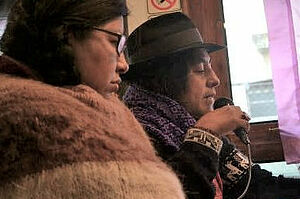Feminism from memory: Community feminism in Bolivia
"First off, we want each person to introduce herself, but not by talking about herself, but about her mother or grandmother. Each person should introduce her mother."
So began the first in a series of workshop on community feminism organized by the Bolivia office of Friedrich-Ebert-Stiftung (FES). What started off as a simple instruction became an explosion of learning, with each of the life stories shared by the workshop participants reflecting the subordinate position of women.
The workshop was facilitated by Adriana Guzmán and Jimena Tejerin, members of the Bolivian movement Community Feminism Against Patriarchy, also member of the movement. At the end of the round of testimonials by the participants, they explained the distinguishing features of community feminism as an approach, one that is not defined from history, but from memory, as a source of continued exploration.
“Feminism is defined as the offspring of the Enlightenment," explained Guzmán. "We are not daughters of the Enlightenment. We do not come from feminism." For Guzmán, community feminism is political action against patriarchy that questions the definitions and chronology posed by the feminist currents that have arisen in Europe and the United States.
Over four sessions, the facilitators of the Introduction to Community Feminism workshop explained how feminist reflection went hand in hand with the political processes of Bolivia’s recent history.
During the 2003 mobilizations in Bolivia, which ended with the resignation of President Gonzalo Sánchez de Lozada and the abandonment of the neoliberal model of the state, women from the working-class areas of La Paz mobilized alongside the men to implement community means of social organization.
The neighbourhood meetings, community meals, and collective decisions that ensure questioned the individualistic principles typical of urban life.
"Motherhood was different on the street; it wasn’t slavery. Now the wawas (small children) were a shared priority; we all took care of them together. They faced no dangers on the street. In the Guerra del Gas [as the 2003 mobilizations were called], the memory of the community was activated," Guzmán explained during the workshop.
But it would take years before community feminism as a form of political action took on its present form in Bolivia. Several rifts accompanied the process: large portion of the women did not consider themselves feminists or gave priority to establishing a political party as a paramount step for the future.
Eventually, community feminism became acknowledged as a social movement that considers the community paramount to building a society without hierarchies.
Focusing on the history of the colonization of Latin America, which left deep vestiges in the region, community feminism proposes the concept of the patriarchal link, which it uses to explain the continuity of dominance over women throughout history, preceding the colonies. Or as Guzmán and Julieta Paredes write in a book they co-authored (link in Spanish):
"The patriarchal link lays clear the combinations, the alliances, the complicities between the invading colonizing men and the indigenous men originating from our peoples, a coordination that was unequal among men but complicit against women, one which conspired to a new patriarchal reality that we are still living in today." (83)
Central to the propositions by community feminism, patriarchy was explained during the workshop by Jimena Tejerin as "the system of all oppression, discrimination, and violence experienced by humanity—men, women, intersex—and nature, historically built on the body of women."
"This space served to enrich our thinking," commented Guzmán during the workshop at the FES office in Bolivia. "It was useful also for community feminism itself, a movement whose own concepts are under construction."
For the people who participated, the workshop was an opportunity to question some of the postulates of the more traditional feminist movements, as well as to question the processes of feminist reflection happening in Bolivia. ###
Claudia Peña has been working as project coordinator at FES Bolivia since November 2016. For more information on the work by FES in Bolivia visit the office website.





